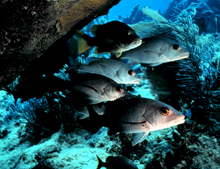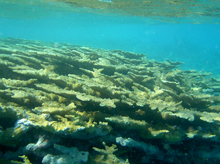Why Are Coral Reefs So Important?
Hidden beneath the ocean's waters, coral reefs teem with life. Fish, corals, lobsters, clams, seahorses, sponges, sharks, and sea turtles are only a few of the hundreds of thousands of creatures that rely on reefs for their survival.

Reefs are home to a wide range of marine organisms. Here, gray snappers find shelter under a reef ledge in the Florida Keys National Marine Sanctuary. Click image for larger view.
A Long-time Legacy
Coral reefs are also living museums and reflect thousands of years of history. Many U.S. coral reefs were alive and thriving centuries before European colonization of the nearby shores. Some reefs are even older than our old-growth redwood forests. They are an integral part of many cultures and our natural heritage. In fact, coral reefs are some of the oldest and most diverse ecosystems on the planet.
Economic Value
Beyond their intrinsic value and their role as a breeding ground for many of the ocean's fish and other species, coral reefs provide human societies with resources and services worth many billions of dollars each year. Millions of people and thousands of communities all over the world depend on coral reefs for food, protection, and jobs. These numbers are especially staggering considering that coral reefs cover less than one percent of the Earth’s surface.

Commercial dive boats offer residents and visitors the opportunity to dive or snorkel on the beautiful coral reefs of the Florida Keys. Currently, there are approximately 80 dive shops located throughout the Keys, which take approximately 900,000 divers and snorkelers to reefs in the Keys annually. Click image for larger view.
Healthy coral reefs support commercial and subsistence fisheries, as well as jobs and businesses that support tourism and recreation. In the United States, coral reef ecosystems support hundreds of commercial and recreational fisheries worth millions of dollars to state and local economies. NOAA estimates the commercial value of U.S. fisheries from coral reefs is over $100 million. In the U.S. territory American Samoa, coral reefs play an important cultural role and supply over 50 percent of the fish caught locally for food.
Local economies also receive billions of dollars from visitors to reefs through diving tours, recreational fishing trips, and other businesses based near reef ecosystems. Every year, scuba divers, snorkelers, and fishermen visit U.S. coral reefs to enjoy their abundant sea life. In the 1990s, over four million tourists visited the Florida Keys each year, contributing $1.2 billion annually to tourism-related services. In fact, the Florida Keys are the number one dive destination in the world. In Hawaii, a state with many coral reefs, one popular reef alone is visited by over three million tourists each year. In the U.S. territories of Guam and the Northern Mariana Islands, over 90 percent of new economic development is dependent on coastal tourism, including reef tourism.
A Natural Shoreline Buffer

A healthy Acropora palmata patch reef shown from above and below water demonstrates the value of the reef to break wave energy. Click image for larger view and image credit.
The coral reef structure also buffers shorelines against waves, storms, and floods, helping to prevent loss of life, property damage, and erosion. Several million people live in U.S. coastal areas adjacent to or near coral reefs, and the well-being of their communities and economies is directly dependent on the health of nearby coral reefs.
Medicinal Benefits
Finally, coral reefs are sometimes called the “medicine cabinets” of the 21st century. Coral reef plants and animals are important sources of new medicines being developed to treat cancer, arthritis, human bacterial infections, heart disease, viruses, and other diseases. Some coral reef organisms produce powerful chemicals to fend off attackers, and scientists continue to research the medicinal potential of these substances. In the future, coral reef ecosystems could represent an increasingly important source of medical treatments, nutritional supplements, pesticides, cosmetics, and other commercial products.
Conclusion

A healthy Acropora palmata patch reef shown from above and below water demonstrates the value of the reef to break wave energy. Click image for larger view and image credit.
Despite their great economic and recreational value, a range of human activities now threatens these important habitats. Many of the world’s reefs have already been destroyed or severely damaged by water pollution, overfishing and destructive fishing practices, disease, global climate change, and ship groundings.
Once coral reefs are damaged, they are less able to support the many creatures that inhabit them. When a coral reef supports fewer fish, plants, and animals, it also loses value as a tourist destination. Further, the absence of reefs acting as natural barriers can increase the damage to coastal communities from normal wave action and violent storms. Therefore, the health of coral reefs depends on sustainable human uses that promote economic development while protecting sensitive coral ecosystems and the creatures that reside there.
